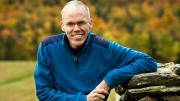In face of rising calls from student groups for the University to divest its investments in fossil-fuel producers’ stocks, the administration has announced a plan to create a “social-choice fund.” It would “take special account of social responsibility considerations”— overseen by the Corporation Committee on Shareholder Responsibility (CCSR)—and dedicate investment returns to supporting financial aid for students.
“This fund will offer donors another way to support Harvard’s financial aid program and the transformational opportunities it offers our students,” President Drew Faust said in a prepared statement, adding that the University will review the experiences of other colleges and universities that operate similar funds, and also draw on the expertise of the Harvard Management Company (HMC). “In addition to their excellent track record as investors,” the statement noted, HMC “has considerable expertise in due diligence processes that rigorously evaluate investment opportunities on a number of levels, including sustainability, governance issues, and other factors.”
Contributions to the new fund, which will be established as of July 1, 2013, the start of the University’s next fiscal year, will be invested in one or more mutual funds selected and approved by CCSR. According to the release, there will probably be no minimum gift amount, and “each year 20 percent of the fund’s beginning market value will be made available to support financial aid.” Given a usual annual distribution from endowment funds of 5 percent of market value, the new fund will operate more like current-use support for financial aid than a conventional endowment managed to sustain a perpetual flow of income.
In a statement released last week to The Boston Globe, University officials said Harvard was unlikely to divest its holdings in fossil-fuel stocks despite pressure to do so from student groups. According to the Globe, one of those groups—Students for a Just and Stable Future (SJSF)—has e-mailed Faust a half-dozen times and visited her office six times without receiving any response. On its website, SJSF calls itself “a student network fighting to ensure a just and stable future for our generation and the generations to come that are threatened by runaway global warming” and claims affiliates at 15 colleges. Most of the college divestment movement is gaining steam at schools in the northeast such as Middlebury, University of Vermont, Tufts, and Vassar, according to the Globe.
But student interest in the issue is apparently widespread. In the Undergraduate Council’s elections this fall, students were presented with a number of issues on which to express their opinions. Referendum 1, which asked, “Do you support Harvard divesting its endowment from the fossil fuel industry in order to avert further environmental and human rights crises due to climate change?" passed with 72 percent support, 2,561 to 995. Also, referendum 3 asked, “Do you support creating a social choice fund within Harvard’s endowment, thereby providing an opportunity for donors to choose whether their contributions to Harvard are invested for positive social impact while also making profit for the University?” It passed with 80 percent support, 2,884 to 699. Last spring, the Responsible Investment at Harvard Coalition (a group of students, alumni, faculty, and staff dedicated to changing the way that Harvard manages its money) raised funds from more than 400 people in less than ten weeks for the Fair Harvard Fund, which the group describes as a monetary petition in support of a Social Choice Fund.
“My argument would be that our most effective impact on climate change is not going to come through any kind of divestment activity,” Faust told the Crimson, which ran an editorial on the topic, “A Coalition of Responsibility,” on December 7. “It’s going to come,” the president elaborated, “through what we do with our teaching, our research, the people…we support, the students who may be the heads of the EPA or all kinds of organizations.”
Middlebury College professor and former Crimson president Bill McKibben ’82—a prominent climate-change activist, and author of The End of Nature and Eaarth: Making a Life on a Tough New Planet—is building a grassroots movement with his “Do the Math” tour—a 21-city, 27-day journey across the United States to encourage colleges and universities to divest their holdings in fossil-fuel companies. (Last summer, McKibben wrote an article for Rolling Stone titled “Global Warming’s Terrifying New Math: three simple numbers that add up to global catastrophe—and that make clear who the real enemy is.”) The tour began in Seattle the day after the November elections. McKibben believes that citizens—college students in particular—must be prepared not only to recognize climate change as an existential threat but to take the fight to major energy companies like ExxonMobil. According to The New York Times, he is encouraging students to fight to the extreme, even if it means jail time: “Some of you will need to go to jail, and we will be there for you,” he said. “If you join this fight, it will be the most important thing.”
Speaking about climate change to The Uptake, an online news video gathering service, McKibben brought up the death and destruction caused by Hurricane Sandy, pointing out that the tropical storm measured 1,040 miles in diameter and yielded barometric pressures lower than ever seen north of Cape Hatteras.
“The official position of planet Earth at the moment is that we can’t raise the temperature more than two degrees Celsius,” he wrote in Rolling Stone. “It’s become the bottomest of bottom lines. Two degrees.”









